Add this eBook to your basket to receive access to all 344 records. Our indexes include entries for the spelling longley. In the period you have requested, we have the following 344 records (displaying 281 to 290): These sample scans are from the original record. You will get scans of the full pages or articles where the surname you searched for has been found. Your web browser may prevent the sample windows from opening; in this case please change your browser settings to allow pop-up windows from this site. Steam Engine Makers in Sheffield
(1910)
The Steam Engine Makers' Society, a trades union, ended 1910 with 13,401 members in 144 branches. The 86th Annual Report gives a full list of members for each branch, followed by Travelling Expenses subsidised by the branch (with names and dates); Unemployed Expenses (with names and dates); Superannuation, Sick and Funeral Expenses (all with names and dates). | Sample scan, click to enlarge

| Superannuated Steam Engine Makers
(1910)
The Steam Engine Makers' Society, a trades union, ended 1910 with 13,401 members in 144 branches. The 86th Annual Report gives a full list of members for each branch. There is also this list of superannuated members granted pensions by the society. In each case the entry gives full name; branch; year admitted; age when admitted to the society; date when superannuation was granted; age when superannuated; and rate per week. | Sample scan, click to enlarge

| Boys entering Brighton College
(1912)
This edition of the Brighton College Register was published in 1922. The plan of the publication was to list boys by year or, later, term of entry. Each name is assigned a sequential number, 5000 boys, in all, being recorded. Full name is given (surname first, in bold); year of birth; year of leaving; and then (wherever the compiler had such information) a short biography, ending with date of death, where known. | Sample scan, click to enlarge
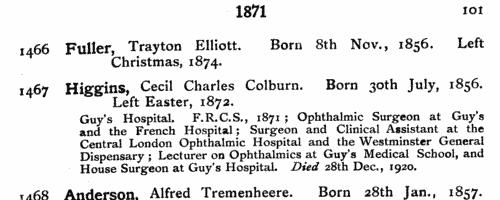
| Civil Servants and Office Holders
(1913)
The Imperial Calendar gives lists of officials and office-holders throughout England, Wales, Scotland and Ireland
| Sample scan, click to enlarge
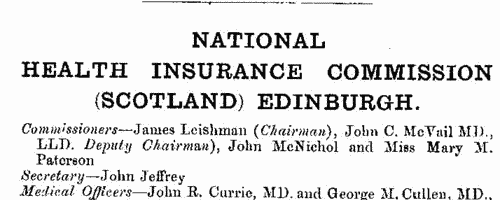
| Boys entering Clifton College
(1914)
Clifton College near Bristol was established in 1862. This edition of the Clifton College Annals and Register for the Old Cliftonian Society by F. Borwick was published in 1925. Boys are listed alphabetically by term of entry, with full names, surname first, in bold. Father's (or widowed mother's) name is given (surname and initials) in capitals, and address. Then there is the name of the house (N. T., North Town; S. H., School House; S. T., South Town), first and last forms, distinctions in school work and games, and month of leaving. Where known, the editor then gave a career summary with month of death; or, if still living, address as in 1925 (in italics). | Sample scan, click to enlarge
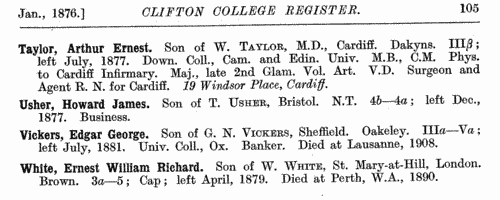
| War Services of British Army Officers
(1915)
Hart's Annual Army List, Special Reserve List and Territorial Force List for 1915 includes this section entitled 'War Services of the Officers of the Active List', covering not only serving officers of the regular army, but also officers of the militia (marked (m)), special reserve (r), territorials (t), volunteers (v) and yeomanry (y). The detailed descriptions of the officers' war services relate not to the Great War, but to previous campaigns, particularly those in South Africa, Egypt, India and China. The regiment &c. in which the officer was currently serving is shown in brackets after his name. | Sample scan, click to enlarge
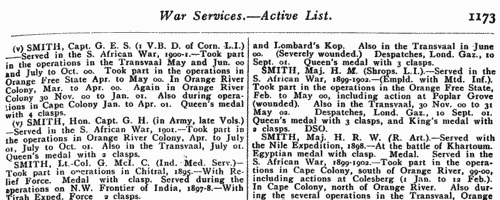
| Killed in action at Jutland Bank
(1916)
Roll of the officers and men of the Royal Navy killed in action at Jutland Bank, 31st May 1916 | Sample scan, click to enlarge
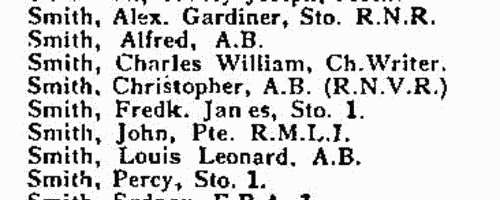
| Military Medal for Bravery in the Field
(1916)
King George V awarded the Military Medal for bravery in the field to these Non-Commissioned Officers and Men 11 November 1916. | Sample scan, click to enlarge
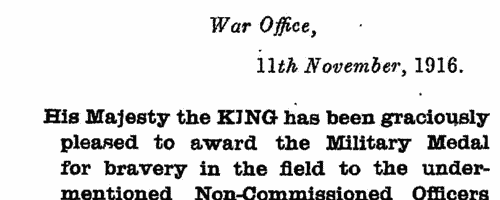
| Soldiers wounded in the Great War: Royal Field Artillery
(1916)
Lists of names of soldiers wounded, died of wounds, died, killed, missing presumed dead, and taken prisoner by the enemy, were issued to the British national press under the title Roll of Honour. Each man is identified by surname, initials and number. The regimental returns from which the daily Roll was compiled were made up over the previous week or weeks. Each regimental return may be partial, covering only part of the alphabet. The lists are provisional, in that a man reported wounded one day may appear as died of wounds later; a missing presumed dead may later be reported as having been found, or as having died; the lists of prisoners of war were provided by the enemy and will relate to captures weeks earlier. However, these rolls are the most comprehensive single source of names of British and allied combatants meeting with misfortune in the Great War. This is the roll published 1 August 1916. The sample scan is taken from a section of the Roll of Honour for the Manchester Regiment. | Sample scan, click to enlarge
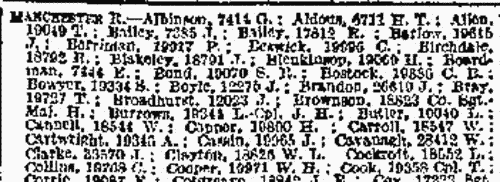
| Boys entering Clifton College
(1917)
Clifton College near Bristol was established in 1862. This edition of the Clifton College Annals and Register for the Old Cliftonian Society by F. Borwick was published in 1925. Boys are listed alphabetically by term of entry, with full names, surname first, in bold. Father's (or widowed mother's) name is given (surname and initials) in capitals, and address. Then there is the name of the house (N. T., North Town; S. H., School House; S. T., South Town), first and last forms, distinctions in school work and games, and month of leaving. Where known, the editor then gave a career summary with month of death; or, if still living, address as in 1925 (in italics). Of course, in the case of boys entering the school in the years immediately before 1925, they were either still at school or their careers were still ahead of them. | Sample scan, click to enlarge
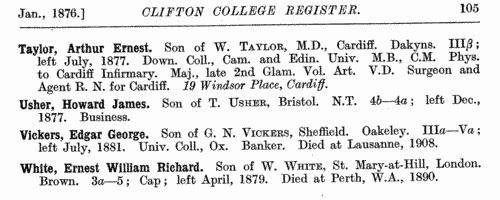
|
Research your ancestry, family history, genealogy and one-name study by direct access to original records and archives indexed by surname.
|











